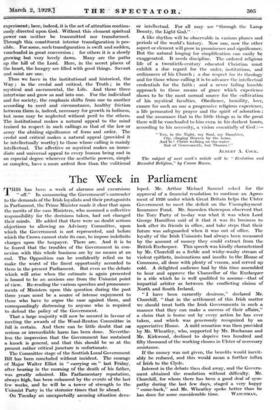The Week in Parliament rimus has been a week of
alaruins and excursions " off." In announcing the Government's surrender to the demands of the Irish loyalists and their protagonists in Parliament, the Prime Minister made it clear that upon the merits of the case Ministers, who assumed a collective responsibility for the decisions taken, had not changed their minds. He added that there were no doubt serious objections to allowing an Advisory Committee, upon which the Government is not represented, and before which the Crown cannot state its case, to impose indefinite charges upon the taxpayer. There are. And it is to be feared that the troubles of the Government in con- nexion with this whole business are by no means at an end. The Opposition can be confidently relied on to make the worst of the finest opportunity accorded to them in the present Parliament. But even so the debate which will arise when the estimate is again presented is bound to be an anxious one from the Unionist point of view. Re-reading the various speeches and pronounce- ments of Ministers upon this question during the past three years_ must be a source of intense enjoyment to those who have to argue the case against them, and correspondingly distressing to anyone who is required to defend the policy of the Government.
That a large majority will now be secured in favour of meeting the awards of the Wood-Renton Committee in full is certain. And there can be little doubt that no serious or irremediable harm has been done. Neverthe- less the impression that the Government has sustained a knock is general, and that this should be so at the present rather critical juncture is unfortunate.
The Committee stage of the Scottish Local Government Bill has been concluded without incident. The courage of Major Walter Elliot hi " carrying on " last Friday, after hearing in the morning of the death of his father, was greatly admired. His Parliamentary reputation, always high, has been enhanced by the events of the last few weeks, and he will be a tower of strength to the Unionist Party in the stormier times that lie ahead.
On Tuesday an unexpectedly amusing situation deve- loped. Mr. Arthur Michael Samuel asked for the approval of a financial resolution to continue an Agree- ment of 1926 under which Great Britain helps the Ulster Government to meet the deficit on the Unemployment Insurance Fund. Mr. Snowden thereupon observed that the Tory Party of to-day was what it was when Lord George Hamilton said of it that it was its business to look after its friends in office, and take steps that their future was safeguarded when it was out of office. The loyalty of the Irish Unionists had always been measured by the amount of money they could extract from the British Exchequer. This speech was kindly characterized by Mr. Churchill as a feeble and wishy-washy stream of violent epithets, insinuations and insults to the House of Commons, all done with plenty of venom, and served up cold. A delighted audience had by this time assembled to hear and approve the Chancellor of the Exchequer in a. role which he is well qualified to assume—that of impartial arbiter as between the conflicting claims of North and South Ireland.
" I have been earnestly desirous," declared Mr. Churchill, " that in the settlement of. this Irish matter we _should treat both the Irish Governments in such a manner that they can make a success of their affairs," a claim that is borne out by every ii.ction he has ever taken, and which was generously recognized by an appreciative House. A mild sensation was then provided by Mr. Wheatley, who, supported by Mr. Buchanan and Mr. Kirkwood, declined to deprive two hundred and fifty.thousand of the working classes in Ulster of necessary assistance.
If the money was not given, the benefits would inevit- ably be reduced, and this would mean a further influx of Irish to the Clyde.
Interest in the debate then died away, and the Govern- ment obtained the resolution without difficulty. Mr. Churchill, for whom there has been a good deal of sym- pathy during the last few days, staged a very happy " come-back," and Mr. Wheatley spoke better than he has done for some considerable time. WATCHMAN.
























































 Previous page
Previous page